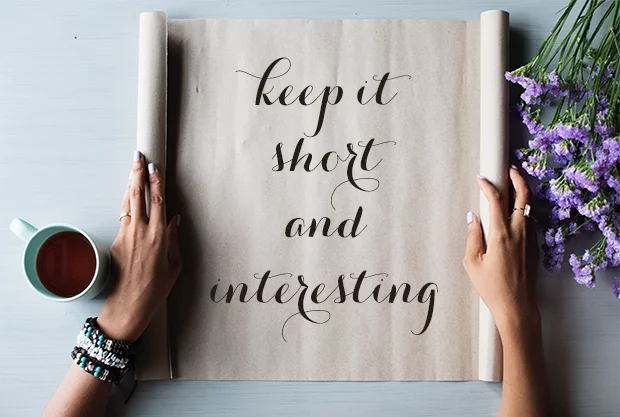How to become a great storyteller
Most of the people think that the art of storytelling is something difficult and complicated, possessed only by a few skilled human beings. This couldn’t be farther from the truth. The reality is, everyone can master the art of storytelling through a lot of practice, ambition and with the proper toolkit. The aim of this article is to teach you how to become a great storyteller! But first, let’s see what exactly storytelling means.
What is storytelling?
Storytelling is an art, for sure. It’s the art to tell stories in order to engage an audience. The storyteller transmits a message, a truth, pieces of information and knowledge in an entertaining way. He uses literary techniques (figures of speech, flashbacks, ironies, symbols etc.), a plethora of skills (musical, artistic, creative) and non-verbal language (facial expressions, gestures) to enhance the audience’s amusement, retention and, understanding of the message. Now that is clear for everybody what storytelling is, you might realize that one way or another, we are all storytellers! We all tell stories in a very natural way, starting at a young age, but how exactly can we master the art of storytelling? If you want to find out how to become a great storyteller, here are some tips & tricks that might help you achieve this goal.
How to become a great storyteller
-
-
Know your audience
-

Keep this in mind: the audience comes always first. Be mindful of who you are telling your story to before you start. It’s very important to be familiar with your public so that your storytelling won’t turn into a complete failure. For instance, if you’re addressing to a group of managers or directors, you should keep a formal and rigorous language and tone, but if your public is a bunch of teenagers or kids, then you should be informal and amusing. No matter how you convey your message, be aware to always engage your audience. In this way, both the content and the delivery of the information need to be different. Look around while talking and pay attention to the way your audience responds to your message. If they’re glazing over, it means that the transmitted information is not aligned with them, and you should immediately take some measures!
-
Captivate your listeners from the beginning
It’s said that first impression matters. This could also be relevant when you’re telling a story, that’s why you should hook your audience from the start. Use something catchy that will make them want to know more. You might say something like “Such a crazy thing happened to me today” or “I have the biggest news to share with you”. Draw your listeners’ attention from the start, make them curious and eager to listen to your story ‘till the end. Don’t begin with uninteresting and boring details such as describing what you had for breakfast that day, because you risk to bore them completely, or even worse, they will tune you out for good! Remember that being a storyteller doesn’t mean only to describe facts or events, it also means to create a fascinating story that is worthy to be shared with others.
-
Keep it short and interesting

How to become a great storyteller also implies keeping your speech brief and attractive. It’s so annoying when someone babbles on about a story that appears to be endless and pointless! Avoid this kind of stories that will definitely make your listeners fall asleep. Your aim is to keep the audience entertained and interested, so stick to significant details and skip the ones that are tiresome. If you want to make your story more alluring, you should simply add some emotional elements. Yes, it’s important to make your story concise and authentic, but it’s crucial to engage your listeners’ emotions. In this sense, your story comes alive and your audience identifies with you and the message you’re sending. Whether you opt for sadness, happiness, astonishment or bitterness, the use of emotions will keep your audience focused and captivated!
-
Practice makes perfect

But how to become a great storyteller when you’re feeling anxious about telling your story aloud to a large public? Don’t worry, we’ve all been there. We promise you that with some practice and ambition you’ll be able to overcome this fear and gain confidence! We suggest you should read your story out loud many times, with concentration and patience. Try meditation, calm breaths, positive thinking, and self-talk or even listen to some peaceful music while reading or repeating the ideas you’re sharing. It’s important to go slow so that your listeners understand clearly your message and have time to absorb all of the information you’re giving to them. If you’re afraid that you’re rushing through your story and speaking way too fast, you might want to try recording or taking a video of yourself. This could really help you to master the art of storytelling!
-
Inspire the people around you

A great storyteller will try to motivate and inspire his audience. In this sense, you should always tell your listeners what you expect from them to do at the end of your speech. Give them the impulse to change their lives into something better or to impact and transform the lives of others. Also, establish a conclusion for your story. Don’t leave the whole message up in the air. Regardless of the plot you’re creating, there should always be a crystal clear ending. Boost your story with “a little bit of magic”. For instance, for blog storytelling context, you can leave your audience with a crucial question about humankind or something very much alike to think of on their way back home.
Bonus tip: Maybe you’re skilled in the art of storytelling, but you’re not such a good writer. You might have the ability to narrate, to express your thoughts and ideas orally, but you can’t organize your information on paper. Everybody knows that a good story starts with good writing, so you have to manage both skills. In this way, we suggest you should read this article that offers you helpful tips and tricks from famous writers.
Mastering the art of storytelling has never been easier. Take advantage of the tips we’re recommending and start sharing your story today! We hope this article will give you more insights on how to become a great storyteller!



